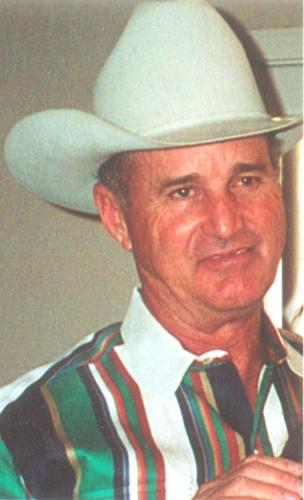On Feb. 22, 2001, Luther Gerald Simmons fired several shotgun blasts into the cab of a truck, taking the life of Herman Newell, the clerk of court in St. Helena Parish.
Simmons, 76, can now hardly walk five steps and should be sent to a nursing facility, instead of dying behind bars for the crime, members of his family and prison officials argued Tuesday.
Their request was denied after a state parole panel heard emotional testimony from the district attorney and the victim's daughter. They begged the three parole board members to consider the horrific nature of the crime — and not the cost of his medical treatment in making their decision.
"My dad was an elected official with an unwavering faith in the justice system. Please do not prove him wrong," said Jennie Newell Perkins, now a prosecutor in the 21st Judicial District.
Simmons was serving life without parole for second-degree murder. However, he was eligible to be considered for release under a 2017 state law that was part of a broader criminal justice reform package.
The bill was passed with an eye toward moving inmates with high medical expenses on to federal Medicare rolls.
The law provides for people convicted of murder to be released to nursing facilities if they have "limited mobility," meaning they are "unable to perform activities of daily living without help." Parole officials can consider factors such as the crime, length of time served, medical condition and risk.
The five members of the Bamburg family sat on black plastic chairs, waiting patiently for the hearing to begin on Thursday in Baton Rouge.
Since the reform was implemented, 14 murderers have been considered by the parole board under this statute, according to state records. Eight have been released.
If released, Simmons likely would have been sent to a state-run nursing facility in Jackson, Louisiana, where he would have remained under supervision by probation and parole officers.
A three-member panel of the Committee on Parole voted 2-1 on Tuesday at state Department of Corrections offices in Baton Rouge to deny the request for a medical treatment furlough.
Several of Newell's family members, as well as 21st Judicial District District Attorney Scott Perrilloux, attended the hearing, as did nearly a dozen of Simmons' family members and friends.
Parole commission Keith Jones cast the lone yes vote to granting a medical furlough; Alvin Roche Jr. and Pearl Wise voted against. They voted after a 10-minute closed door session to discuss the case.
At Simmons' second-degree murder trial in 2002, witnesses testified that Newell was out with Simmons' estranged wife on the day of the murder.
Simmons, apparently jealous, waited for him at her car, which was parked outside a grocery store near Montpelier. When Newell returned in his truck with Simmons' wife, Simmons began firing into the truck, killing the clerk.
Newell's daughter said Tuesday she still recalls Simmons reciting at his sentencing this verse from the Bible: "For jealousy arouses a husband's fury, and he will show no mercy when he takes revenge."
Simmons' attorney argued at trial that he was under the influence of painkillers and lacked specific intent to kill.
Simmons participated in Tuesday's hearing by video conference from Dixon Correctional Institute, where he was surrounded by an attorney, prison staff and supporters.
First, prison officials and his daughter made their case for Simmons' release, citing a long list of health conditions and describing the many medical procedures he has undergone while in prison.
Among them: A ruptured appendix, kidney failure, osteomyelitis, diabetes, hip replacement surgery, open-heart surgery and three times weekly dialysis treatments.
"He requires some significant assistance simply to transfer from the bed to the wheelchair," said DCI Assistant Nursing Director Terry Grady.
Simmons' daughter Charlee Wedgeworth, who began her remarks by apologizing for her father's "senseless act," said that moving her father to a state-run nursing home would not affect how often she can visit him. But it would affect his care.

Herman Newell is surrounded by his daughters, from left to right, Jennie Newell Perkins, Bonnie Newell Jordan, Kristie Bridges and Jessica Newell Dupepe, in an undated photograph. Newell, then the clerk of court in St. Helena Parish, was killed by Luther Gerald Simmons in 2001.
Due to state regulations, whenever Simmons is hospitalized he must be handcuffed to the bed. Last summer, he developed pressure sores after spending six weeks chained to a hospital bed, she said.
"He's basically an invalid," Wedgeworth said.
Newell Perkins took the podium next. She described in painful detail how Simmons shot her father several times, "pausing only to reload," and asked the board to consider the emotional toll of the crime.
"What Gerald Simmons did to my father was cold, methodical and brutal," she said.
She argued that deciding to release Simmons would amount to a fiscal decision that did not serve the interests of justice.
"Here we are considering whether the medical bills of a convicted killer determine what is right, what is just," Newell Perkins said.
She began to tear up and paused before adding, that she will "never be able to understand why Gerald Simmons deserves a better death" than her father.
Perrilloux, who acknowledged Simmons posed no safety risk, later told the board that it would be unjust for Simmons to have any measure of freedom that he would be allotted in the nursing home.
All 10 bills of a dramatic overhaul of Louisiana's criminal justice system have passed both chambers of the Legislature, and are within reach …
"We're not talking about somebody who has been in prison 30 to 40 years," he said.
Taking a chance to speak for himself, Simmons said he wished to tell the Newell family how sorry he is for his actions. He asked for their forgiveness, making a comparison to how he had forgiven someone who killed his nephew in the 1980s.
Simmons' attorney, Keith Nordyke, highlighted that his client was an extremely low-risk offender and served as a trusty at the Louisiana State Penitentiary at Angola.
"We're not asking for his release to the community. We're asking for a move to a nursing home just a few miles down the road from where he is right now," Nordyke said.
Nordyke said after the hearing that there is a reconsideration process, but he has not yet determined if they will do it.





